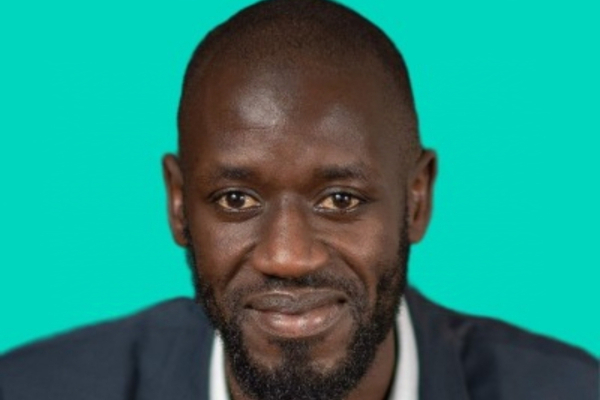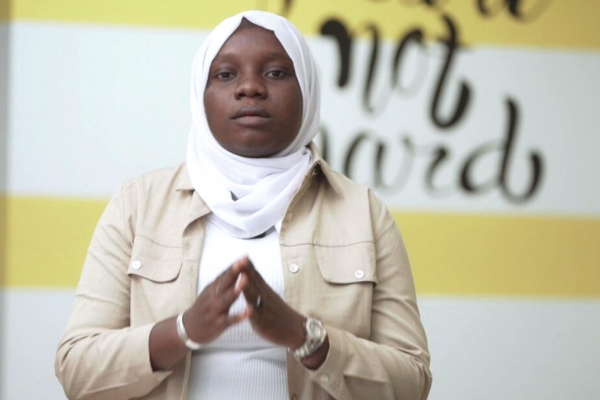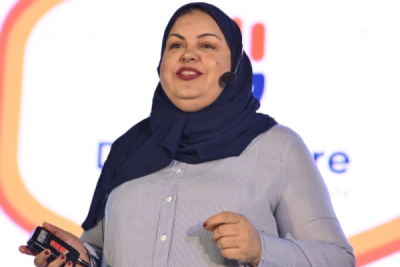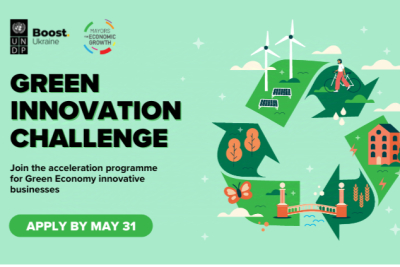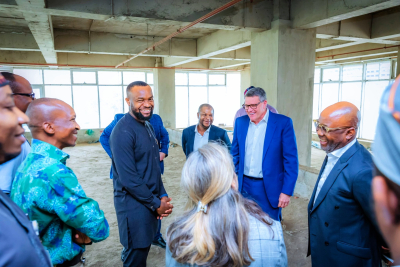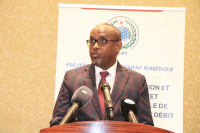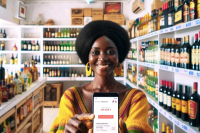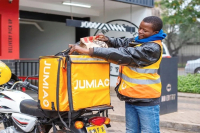As a tech entrepreneur, he develops digital solutions to help businesses enhance their performance. He has already co-founded several companies.
Mamadou Ndiaye (photo) is a Senegalese IT specialist and entrepreneur. He is the co-founder and CEO of Appsaya, a startup offering digital solutions designed to optimize community and event management across Africa.
Founded in Malaysia in 2015, Appsaya provides event organizers with a platform featuring real-time data management and analytics tools. The platform also supports the creation of dynamic communities and enhances networking opportunities through artificial intelligence, helping small and medium-sized enterprises access new markets.
“Our solution efficiently manages professional communities, encourages connections, boosts engagement, and fosters collaboration. Additionally, our platform offers various monetization opportunities,” the company states.
On October 10, Appsaya earned third place at the Orange Social Venture Prize Africa and Middle East (POESAM), receiving a reward of 3 million CFA francs (approximately 5,000 USD).
Beyond his role at Appsaya, Mamadou Ndiaye serves as a strategic advisor at MY Evolution, an IoT connectivity provider. In 2013, he co-founded iReservos, an appointment management platform for service businesses in France, serving as its CEO until 2016.
In 2020, he co-founded La French Tech Malaysia, a French-Malaysian tech community based in Kuala Lumpur, Malaysia. The following year, he launched Wasabih, a Malaysian startup that connects professionals and businesses within various sectors of the halal economy.
Mamadou Ndiaye holds a master’s degree in electrical and computer engineering from ESIGELEC, an engineering school in France. His professional journey began in 2005 at DXC Technology as a computer engineer. In 2010, he worked as an international project manager for L’Oréal, the French beauty company.
In 2012, he became a project director at Shine Mobile Gibraltar, a UK-based telecommunications company. In 2014, he joined update software AG, a French IT firm, as a consultant. From 2020 to 2022, he worked as a senior project manager at JCDecaux, a French advertising company.
Melchior Koba
She promotes healthy and environmentally friendly farming practices, using technology to help farmers make informed decisions.
Afoussata Thiam (photo) is a Senegalese information and communication technology (ICT) and sustainable agriculture expert. She is the founder and CEO of AGROMET SERVICE, a tech startup dedicated to optimizing agricultural practices.
Founded in 2021, AGROMET SERVICE aims to address the social and environmental challenges faced by farmers, particularly those related to climate change. The company specializes in designing smart, connected weather stations that provide farmers with real-time meteorological data and alerts about climatic conditions.
“Unlike other methods that are not accessible to everyone, this eco-friendly solution is equipped with reliable and durable weather sensors, paired with a simple and user-friendly application. Our product is accessible, affordable, and profitable,” the startup explains.
On October 10, Afoussata Thiam secured second place for AGROMET SERVICE at the Orange Social Venture Prize Africa and Middle East (POESAM) in Senegal, earning a reward of 4 million CFA francs (approximately 6,600 USD).
Afoussata Thiam graduated from the University of Sine Saloum El-Hadj Ibrahima Niass in 2022 with a degree in AgroTIC, or ICT applied to agriculture.
Melchior Koba
The Nigerian government is taking steps to develop digital skills among its population, with a focus on its youth. In May 2024, Nokia partnered with the country's telecom regulator to train young Nigerians in 4G and 5G technologies.
Swedish tech company Ericsson plans to invest $19 million in building a technology center in Nigeria. The initiative was disclosed on Thursday, October 17, by Peter Olusoji Ogundele, the managing director of the company’s Nigerian subsidiary, during a business forum held as part of a two-day working visit by Nigeria's Vice President, Kashim Shettima (pictured), in Sweden.
“Nigeria has enough youths that can come into that field. We can train them, Ericsson will also take part in it, and some of them we can export to the world, and we will be like another India,” Ogundele stated.
This partnership comes in the context of increasing demand for digital skills as the country’s digital transformation accelerates. In October 2023, the government launched the "3 Million Technical Talent (3MTT)" program, aiming to train 3 million Nigerians in technical skills over three years. In recent months, it has also formed partnerships with companies such as Finnish equipment manufacturer Nokia and telecom infrastructure builder IHS Towers to train Nigerians in digital competencies.
Ericsson’s initiative is expected to create additional jobs and enhance the skills of workers, addressing the growing need for a qualified workforce as Nigeria’s digital transformation progresses. A 2021 World Bank study estimates that Nigeria will require approximately 28 million workers trained in digital skills across various economic sectors by 2030.
Isaac K. Kassouwi
Fully aware of the importance of building an inclusive digital economy for the deaf community in Tunisia, she leverages technology to connect deaf individuals to employment opportunities.
Sonia Kherigi Nasfi (photo) is a Tunisian computer scientist and tech entrepreneur. She is the founder and CEO of Deaf Square, an online platform that serves as a career accelerator for deaf individuals by connecting deaf talents with employers.
Deaf Square is dedicated to empowering the deaf community. It offers tools for learning sign language, a personalized job-matching service, and training for employers to promote inclusive work environments. Using artificial intelligence, the startup works to enhance the social and economic inclusion of the hearing impaired. It provides an AI-empowered virtual trainer that offers adaptive learning in multiple languages, ensuring personalized support for each user.
“At Deaf Square, we offer courses exclusively in sign language. Our team consists of deaf, hard-of-hearing, and hearing individuals. All our developments are based on user experience. Often, companies are legally required to hire people with disabilities but don’t know where to find these talents. Our job is to connect deaf talents with employers,” explains Sonia Kherigi Nasfi.
Since 1998, Sonia has also held the position of director at the Central Bank of Tunisia. In 2019, she became a coach in NLP (neuro-linguistic programming). She is also the focal point for the association Positiver in Tunis, supporting regional initiatives, particularly by mentoring youth and women in project development.
A graduate of the Higher Institute of Management in Tunis, where she earned a master’s degree in IT management, Sonia made headlines in July 2024 when she won the regional prize at the 11th edition of the Northern Africa Startup Awards, part of the Global Startup Awards Africa. She is also the 2024 winner of the Tunisian stage of the Orange Social Entrepreneur Prize in Africa and the Middle East (POESAM).
Melchior Koba
Nigerian startups focused on sustainability and innovation are invited to apply for the Sterling Bank Green Innovation Challenge.
The initiative offers NGN2 million (US$1,200) grants for cleantech and social enterprise ventures and a NGN20 million (US$12.2 million) facility for agriculture businesses.
Applications are open until October 20. Applicants must have operated for at least two years, offer locally developed solutions, and have a scale-up plan.
Cybersecurity is becoming increasingly important as more of Africa’s economy, businesses, and public services go digital. Establishing cybersecurity infrastructure is a crucial step for several reasons, particularly given the context where data protection and digital security are critical for economic stability and growth.
The Federal Government of Nigeria, in partnership with cybersecurity firm Cisco, has announced plans to establish a state-of-the-art cybersecurity and broadband laboratory. This initiative aims to strengthen Nigeria's digital infrastructure and enhance its cybersecurity capabilities.
The announcement was made by Minister of Communications and Digital Economy, Bosun Tijani, after an inspection of the proposed facility on October 16. He noted that the collaboration with Cisco follows months of discussions, including talks "most recently on the sidelines of the United Nations General Assembly (UNGA79) in New York, where they reaffirmed their commitment to supporting our digital transformation initiatives."
Cybercrime in Nigeria is on the rise, with data breaches increasing by 64% in Q1 2023 compared to the previous quarter, the National Bureau of Statistics (NBS) highlights this concerning trend. This makes the initiative even more crucial for economic stability.
The lab will play a significant role in improving the country's cybersecurity capabilities, which is essential as more Nigerian businesses and individuals adopt digital platforms. Strengthening cybersecurity will not only help to protect sensitive data but also boost public confidence in Nigeria’s digital economy, enabling its continued growth.
Hikmatu Bilali
He is an entrepreneur passionate about sustainability and innovation in Morocco. Through his startup, Savey, he has established himself as a key player in promoting sustainable and responsible food practices.
Ouahi Zakaria (photo) is a Moroccan entrepreneur, co-founder, and CEO of Savey, a digital and logistics solution combating food waste.
Savey is a Moroccan initiative aimed at reducing industrial food waste by offering a distribution channel for unsold, overstocked, or nearly expired products. It connects manufacturers, producers, and distributors with restaurants, cafes, hotels, pastry shops, and bakeries, among others, while also providing free delivery services.
“Our mission is to move towards zero food waste by creating a multidimensional impact on the ecosystem and positively influencing our consumption habits to optimize the use of still-edible food,” states the company’s website.
Committed to protecting the planet, the startup also engages in charitable actions. Every day, it distributes hundreds of meals, collected from its partners, to homeless individuals. It also supplies zoos and associations with food donations.
In September 2024, Ouahi Zakaria won first place in the national stage of the Orange Social Entrepreneur Prize in Africa and the Middle East (POESAM).
Melchior Koba
The Djiboutian government has outlined a clear vision: to drive the country toward digital emergence by 2035. A cornerstone of this transformation is the expansion of high-speed internet infrastructure, which the government sees as a vital catalyst for achieving this ambitious goal.
On Wednesday, October 16, Djibouti took a significant step toward digital transformation with the launch of its national broadband development strategy. The official presentation was held during a workshop organized by the Ministry of Communication, in charge of Posts and Telecommunications. This ambitious plan aims to accelerate the expansion of fiber-optic coverage and democratize access to high-speed internet, both fixed and mobile, across the entire country.
According to the Minister of Communication, responsible for Posts and Telecommunications, Radwan Abdillahi Bahdon (photo), the new strategy advocates for lower tariffs and doubling internet speeds without increasing costs. It also focuses on regulatory frameworks, promoting computer literacy, and developing infrastructure, among other priorities.
The initiative is part of the “Djibouti Digital Foundation” project. Supported by the World Bank, this project aims to transform Djibouti into a tech hub by 2035 by promoting digital services and creating a favorable environment for private sector investments in ICT.
Early results of this strategy include the deployment of 250 km of fiber-optic cable in the northern part of the country and the connection of over 100 administrative buildings to high-speed networks. These efforts have helped bridge the digital divide between regions and modernize public services.
With this new strategy, Djibouti aims to address its internet challenges. The country is currently connected to nine submarine fiber-optic cables. Despite these multiple connections, the World Bank has raised concerns about the high cost and poor quality of internet service. In its 2023 diagnostic report on Djibouti's digital economy, the international institution highlighted that the price of high-speed internet in Djibouti is among the highest in the Middle East and North Africa (MENA) region.
The informal sector is highly developed in many countries across the continent. This solution was developed to support players active in that sector.
Waribei is a fintech solution developed by an Ivorian startup. It enables small merchants to procure stock directly from wholesalers and gives the latter access to bank credit. The startup, based in Abidjan, was founded in 2023 by Ladislas Pham and Frédéric Fameni.
Earlier this month, it announced the successful completion of a funding round, raising 750,000 euros (approximately $813,500) from Mstudio and Saviu Ventures. The funds will be used to expand its operations and support its growth.
“We spend time in the markets, understanding the daily challenges [businesses] face, to design solutions that truly meet their needs. At Waribei, we want to ensure that merchants can grow their businesses without worrying about maintaining stock levels or struggling to secure loans,” said Ladislas Pham.
The solution includes an Android app that allows users to create an account, check partner suppliers and benefit from the advantages offered. Each user is granted an advance amount to purchase stock. With a pre-generated QR code (waricode), the user can make purchases from a supplier partnered with Waribei.
The fintech acts as a link between banks, suppliers, and small merchants, with plans to expand into other francophone African countries.
Adoni Conrad Quenum
With an increasing number of young, tech-savvy consumers and rising internet penetration across the continent, Jumia’s strengthened presence could drive significant growth and innovation, ultimately contributing to the development of Africa’s broader eCommerce ecosystem.
On October 16, Jumia Technologies AG, the African eCommerce giant, announced plans to cease its operations in South Africa and Tunisia by the end of 2024. This strategic move aims to optimize resource allocation, allowing the company to concentrate on core markets with higher growth potential, such as Nigeria, Kenya, Egypt, and Morocco. The decision follows a thorough review of Jumia’s operations led by CEO Francis Dufay.
Explaining the move, Dufay said, “After a thorough analysis, we made the difficult decision to close down our operations in South Africa and Tunisia. The macroeconomic conditions in both markets, coupled with stiff competition, have limited growth potential.” In 2023, Jumia's South African arm, operating under the brand Zando, and its Tunisian operations contributed only 3.5% and 2.7% of total orders, respectively, underscoring their minimal impact on the company’s overall performance.
This closure aligns with Jumia's broader effort to streamline operations and enhance profitability amid challenging market conditions and competitive pressures. As the company refocuses on its core markets, it aims to leverage its marketplace, logistics network, and JumiaPay platform to drive sustainable growth in Africa’s most promising regions. This pivot reflects Jumia's commitment to adapting its strategy to navigate complex market dynamics and return to profitability.
According to the Africa E-Commerce Market Size, Share, Trends 2024-2032 report by the IMARC Group, the market is projected to reach $939.8 billion by 2032, growing at a compound annual growth rate (CAGR) of 14.4% from 2024 to 2032. This rapid expansion highlights the increasing role that online shopping will play in Africa's future, fueled by rising internet access, growing mobile penetration, and a youthful, tech-savvy population.
Hikmatu Bilali
More...
Partnerships with advanced technology nations can accelerate Africa’s digital transformation by bringing in expertise, infrastructure, and cutting-edge technology. This helps build local capacity, allowing African nations to become more self-reliant and competitive globally in fields like tech manufacturing and innovation.
Kenya signed a Memorandum of Understanding (MoU) on October 15 with the Korea Electronic Association (KEA) to establish a $1.4 million tech manufacturing support center at Konza Technopolis. This initiative aims to accelerate local tech production and further establish Kenya as a technology hub in Africa. The center will support product launches, workforce training, and local production of high-tech products from leading Korean companies.
John Paul Okwiri, CEO of Konza Technopolis, emphasized the center’s potential to advance the region’s tech landscape, citing it as a “testament to our take off as we expect substantial investment by korea companies in the electronics and IT ecosystem.”
The center’s construction, expected to take two to three years, will be managed by KEA, which represents over 370 major Korean tech firms, including Samsung and LG Electronics. The project will unfold in four stages: initial planning, electronics manufacturing training, equipment installation, and operational expansion with enterprise support.
In its ECONOMIC SURVEY 2024, the Kenya National Bureau of Statistics revealed that the Information and Communication sector contributed 9.3% to GDP in 2023. To diversify the economy, the government aims to see this sector take on greater economic value. It has been undertaking policy reforms and major infrastructure projects to this end for several years to attract investors. This Tech Manufacturing Hub is one of the manifestations of this ambition.
The center is set to support the annual launch of 30 tech products, reducing average production time to six months. It also aims to train approximately 100 individuals while supporting over 100 local businesses. This collaboration reflects Kenya’s strategy to harness technology for economic growth, create jobs, and enhance its role in Africa’s digital economy.
Hikmatu Bilali
He aims to bridge the gap between academic training and the needs of the professional world. He supports young IT students while providing businesses with digital solutions.
Roussel Célestin Andriamitasoa is a Malagasy IT specialist and tech entrepreneur. He is the co-founder and CEO of Kante Company, a digital agency and platform dedicated to the professional integration of IT students.
Founded in 2022, Kante Company specializes in web and mobile application development, IT education, design, data science, and artificial intelligence (AI) engineering. The company provides young graduates with their first professional experience, enhancing their skills and helping them integrate into the job market, thus bridging the gap between academic training and employment in the tech sector.
“After their training with us, we collaborate with several digital services companies (ESNs) and both local and international firms to place these students in companies once they graduate. With over two years of experience gained through our platform, they are able to start successful careers,” explains the company, which won first place in the Orange Social Venture Prize Africa & Middle East (POESAM) 2024 for Madagascar.
Roussel Célestin Andriamitasoa graduated from IT University, an online learning provider, with a bachelor’s degree in computer science in 2023. Between 2021 and 2022, he worked as a client advisor at Intelcia, a business consulting firm. From 2023 to 2024, he was a developer at Lifetime Travel, a Malagasy company.
Melchior Koba
She is an expert in artificial intelligence, energy management systems, as well as smart grids and meters. She leverages technology to revolutionize how Cameroonians use electricity.
Agnès Virginie Tjahe (photo) is a Cameroonian tech entrepreneur and the founder of EMKit, a project aimed at addressing various issues related to electricity consumption, including overbilling, underbilling, excessive use, and energy fraud.
Launched in 2019, EMKit offers a system that allows users to monitor and manage their electricity supply and consumption remotely via SMS and the Internet. The kit collects consumption data every hour, which can be used to develop big data solutions for the energy sector. The project also aims to integrate artificial intelligence to enhance decision-making in the field.
EMKit optimizes energy use in Africa by helping reduce high electricity bills for households and combating fraud and underbilling on the power grid. The solution promotes energy efficiency, supports the development of smart grids, and drives the growth of big data in the energy sector.
The startup has already developed three different prototypes and installed ten kits in households in the western region of Cameroon. In August 2024, Agnès Virginie Tjahe won the women’s prize and first place on the Orange Social Venture Prize Africa & Middle East (POESAM) national stage in Cameroon.
In addition to her entrepreneurial work, Agnès Virginie Tjahe is a lecturer in the Department of Mechanical and Production Engineering at the Fotso Victor University Institute of Technology, part of the University of Dschang in Cameroon.
She holds a master’s degree in mechanical engineering obtained in 2014 from the National Advanced School of Agro-Industrial Sciences (ENSAI) at the University of Ngaoundéré, and a PhD in energy mechanics from the University of Dschang, earned in 2019.
Melchior Koba
As the world becomes increasingly digital, it's essential for the judicial system to effectively manage cases involving digital evidence. In Africa, initiatives are underway to adapt to these new realities.
The Seychelles judicial system announced on Tuesday, October 15, a two-day training session at the Palais de Justice in Port Island. Conducted in partnership with the International Law Enforcement Academy (ILEA) and the U.S. Secret Service, the initiative aimed to strengthen the skills of Seychellois judges and legal professionals in handling and authenticating digital evidence.
According to a statement from the judicial system, the training emphasized the need to understand how digital information flows, the importance of protecting people's privacy online, and the difficulties of using digital evidence in court cases, especially when the crimes happen across different countries. Topics covered included the evolution of laws in response to digital advancements, the balance between privacy protection and security requirements, and the authentication of digital evidence. Judges were trained to distinguish between legitimate evidence and potentially falsified information, using examples from social media platforms like Facebook and manipulated images.
This initiative comes amid a global trend where the use of digital data is becoming increasingly vital for the administration of justice. The digital era and the emergence of new technologies, such as AI, demand that judicial systems modernize. A survey by Cellebrite, an Israeli cybersecurity firm, revealed that 60% of over 2,000 investigators, prosecutors, managers, and digital forensics experts surveyed believe digital evidence is more critical than DNA. Additionally, 74% of respondents stated that digital data increases the success rate in resolving cases, underscoring the crucial need for specialized training in this area.
As a result, judges in the Seychelles are now better equipped to tackle challenges associated with managing digital evidence. This initiative not only enhances the judiciary's ability to address current challenges but also reinforces its commitment to transparency, security, and fairness in the age of digital transformation.
Samira Njoya


